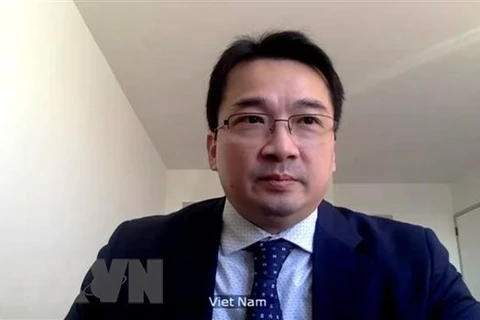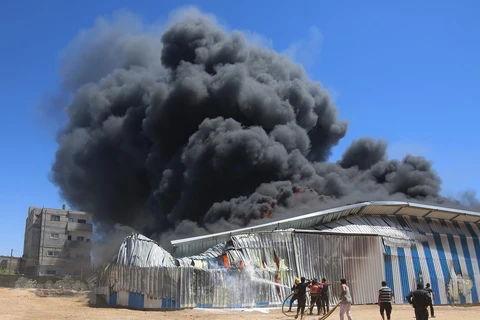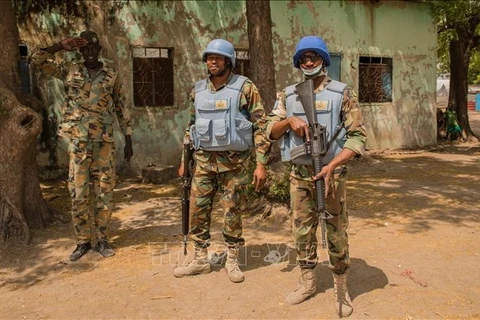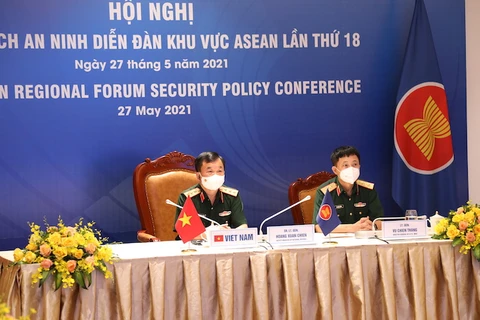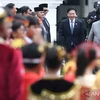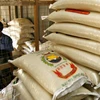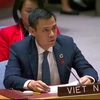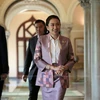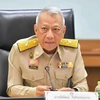Hanoi (VNA) - Ambassador Pham Hai Anh, Deputy Permanent Representative of Vietnam to the United Nations, has told a UN Security Council meeting that the most important factor in fighting terrorism today is to unite, intensify international cooperation, support countries and regions to strengthen their capacity of detecting, preventing and combating international terrorism, as well as help countries to sustainably recover from the COVID-19 pandemic, and ensure equitable access to vaccines.
Addressing the virtual Arria-formula meeting on “the impact of the COVID-19 pandemic on international efforts to prevent and counter terrorism and violent extremism” on June 16, Anh emphasised the need to solve the root causes of terrorism through economic development, national reconciliation, and building a society that is just, tolerant and self-resistant to terrorism and extremism.
It is also necessary to ensure that counter-terrorism measures are consistent with the fundamental principles of the UN Charter and international law, he noted.
The Arria-formula meeting was organised by Tunisia in cooperation with Estonia, France, Ireland, Kenya, Niger, Norway, Saint Vincent and the Grenadines, the UK, and Vietnam.
Assistant Secretary-General Michèle Coninsx, who is Executive Director of the Counter-Terrorism Committee Executive Directorate (CTED), stated that the long-term socio-economic impacts of the pandemic will create favourable conditions for terrorism, especially in countries with fragile political and economic situations.
She said that the post-pandemic anti-terrorism policies should ensure the gender factor and focus on equal distribution of COVID-19 vaccines, while calling for increased coordination of global efforts to combat terrorism and ensure an inclusive, equal and respectful approach to human rights and dignity.
Delegates affirmed their commitments to maintaining solidarity against terrorism and extremism, and stressed the need to guarantee basic human rights in combating terrorism, facilitate access to humanitarian aid, and strengthen national capacity and the role of regional organisations, and support the role of the United Nations Office of Counter-Terrorism (UNOCT) and CTED./.
Addressing the virtual Arria-formula meeting on “the impact of the COVID-19 pandemic on international efforts to prevent and counter terrorism and violent extremism” on June 16, Anh emphasised the need to solve the root causes of terrorism through economic development, national reconciliation, and building a society that is just, tolerant and self-resistant to terrorism and extremism.
It is also necessary to ensure that counter-terrorism measures are consistent with the fundamental principles of the UN Charter and international law, he noted.
The Arria-formula meeting was organised by Tunisia in cooperation with Estonia, France, Ireland, Kenya, Niger, Norway, Saint Vincent and the Grenadines, the UK, and Vietnam.
Assistant Secretary-General Michèle Coninsx, who is Executive Director of the Counter-Terrorism Committee Executive Directorate (CTED), stated that the long-term socio-economic impacts of the pandemic will create favourable conditions for terrorism, especially in countries with fragile political and economic situations.
She said that the post-pandemic anti-terrorism policies should ensure the gender factor and focus on equal distribution of COVID-19 vaccines, while calling for increased coordination of global efforts to combat terrorism and ensure an inclusive, equal and respectful approach to human rights and dignity.
Delegates affirmed their commitments to maintaining solidarity against terrorism and extremism, and stressed the need to guarantee basic human rights in combating terrorism, facilitate access to humanitarian aid, and strengthen national capacity and the role of regional organisations, and support the role of the United Nations Office of Counter-Terrorism (UNOCT) and CTED./.
VNA

